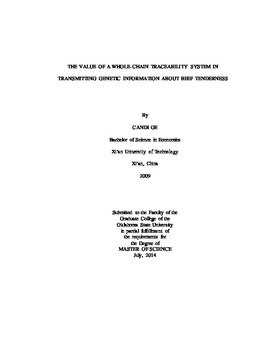| dc.description.abstract | Traceability in food supply chains has many potential benefits, including increased food safety, more efficient supply chain management, and greater opportunities for providing value-added products to consumers. In the case of livestock, traceability can provide enhanced disease prevention and mitigation. For these reasons and more, many major beef producing countries have implemented beef traceability systems. Of these, some are mandatory (such as European Union, Canada, Mexico, and Japan) while other countries such as the U.S. have encouraged voluntary systems. Especially where traceability systems are voluntary, in order for a large number of producers to participate in a whole-chain traceability system, they must believe that the benefits outweigh the costs.In this study, we estimate the benefits relative to the costs of implementing a whole-chain-traceability-system (WCTS) in a supply chain composed of three stages: cow-calf producer, feedlot, slaughter/packing plant, by selecting genetics that produce beef that is more tender than average. As a first step in estimating benefits of WCTS, separate from effects of market linkages between stages of supply chain, we provide upper-bound estimates by assuming a vertically-integrated company. Profits in two scenarios are estimated and compared. In Scenario I, the enterprise uses artificial insemination to select favorable genes, implements a WCTS to track and trace genetically-improved animals, and tests for beef tenderness. In Scenario II, the enterprise chooses not to use artificial insemination or WCTS, so there is no improvement in the distribution of genotypes. Results show that revenue could increase by $58.53/head, compared to additional costs of $5/head for implementing WCTS and $16/head extra cost for using artificial insemination for improving beef tenderness, and costs of testing for beef tenderness. If tenderness testing costs less than $37.53/head, or if other benefits of implementing WCTS can be realized, there is incentive for such a company to implement WCTS for the purpose of improving beef tenderness. | |
